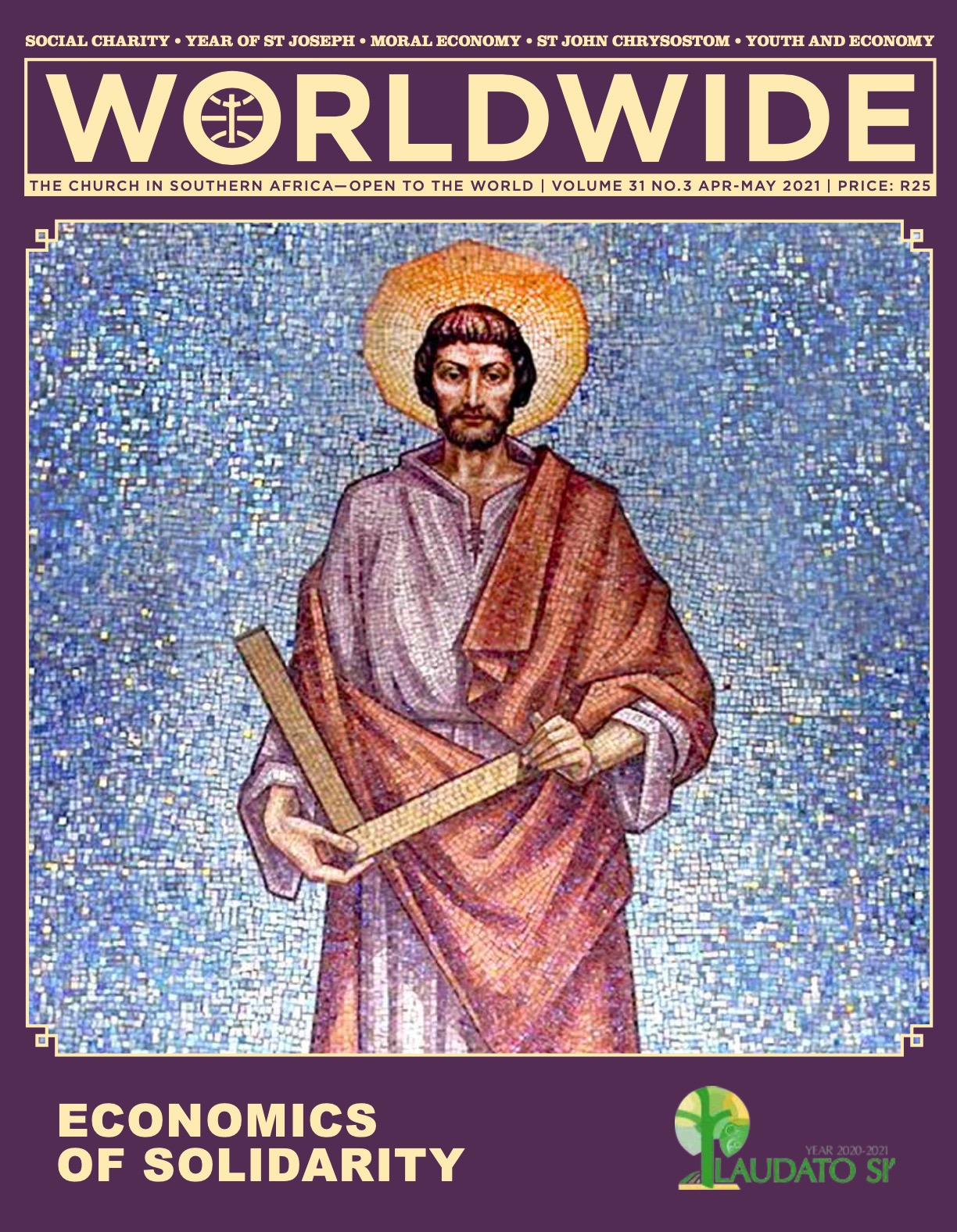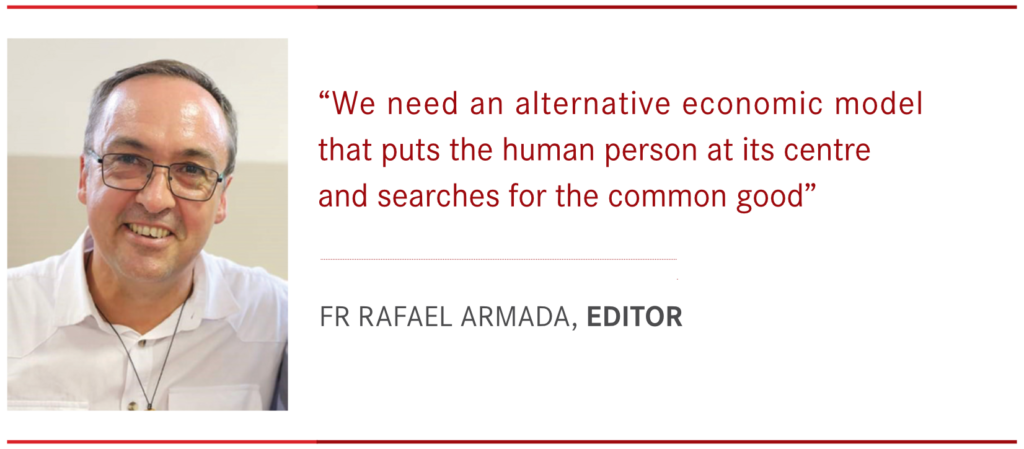
St Joseph and The Dignity of Human Work
We are celebrating the Year of St Joseph. He is, for us Christians, an example of honesty and fidelity, a model of the father figure in the family. He is the humble and firm man who sustained the Holy Family through very difficult situations. This mosaic, portraying him as a carpenter, reminds us of the dignity of human labour. Through work, we become collaborators in the building of society, contributing to it with our various talents. Job creation and sharing of opportunities need to become part and parcel of a new economics of solidarity. Social charity, sustainability and respect for the environment will be integral elements of that model that aims at respecting the dignity of every person.
EDITORIAL

An Economic Model for Integral Development
BY FR RAFAEL ARMADA | EDITOR
JESUS TELLS us that He has come so that “we may have life and have it in abundance“ (Jn 10: 10), but we can ask ourselves what this fullness of life means for humanity today. In the past, many people may have associated it to unlimited economic growth. However, unequal economic prosperity, and lacking integral human development for all, has not produced a better world. In his latest encyclical, Fratelli Tutti (FT), Pope Francis stresses it: “Obsession with a consumerist lifestyle, above all when few people are capable of maintaining it, can only lead to violence and mutual destruction (FT 36).
We have created an economy that kills, discards people and depletes our natural resources. The capitalistic mentality of the free market, with a nearly exclusive concern for obtaining a maximum profit, has failed us and provoked havoc in swaths of people. It has pushed them to the ditches of society and brought along a vertiginous deterioration of the planet, this manifested both in acute climate change and a rapid loss of biodiversity.
The cry of the earth and the poor are one; and both are crying under the current dominant economic paradigm. We find ourselves immersed in a world full of conflicts, the threat of climate change, with its devastating effects, especially for the poorer countries, and paralysed societies due to COVID. Often, the dignity of every human being, sacred and inviolable as it is, and gra- tuitously given to all by God, is not respected.
Therefore, we need an alternative economic model that puts the human person at its centre and searches for the common good; a paradigm that allows all people to satisfy their basic needs and to have a dignified life. “The decision to include or exclude those lying wounded along the roadside can serve as a criterion for judging every economic, political, social and religious project“ (FT 69).
We cannot think anymore as isolated nations; we need instead a global order that sees the interest of all. We have realized that human beings and the planet share a common destiny; we are inextricably interwoven. The earth has the capacity to maintain us all, but not if greed and selfishness become unbridled. In fact, some studies show that ‘more is not always better’. Societies that have reached a moderate income of $12 000 per capita a year, can experience good levels of happiness. A country such as Costa Rica, with that approximate income, occupies the 58th position in the world ranking of wealthiest nations, according to the International Monetary Fund (IMF), but scores the 15th place in the list of most happy societies. On the contrary, not always the richest societies are happier. For instance, the USA, the 5th richest country in the world as per capita income, according to IMF, goes down to 18th place in the world ranking of happiness.
We cannot think of a decent life for humanity without considering sustainability, respect for ecosystems and protection of their biodiversity. Climate change threatens the lives of the poor and of the planet; we need to act urgently. The wealthiest groups will have to decrease their economic growth if we want a sustainable world. It is morally unacceptable to demand the poorer societies to decelerate economically, when many of the basic needs of their populations are not yet catered for. Nevertheless, they should avoid the path of mistakes and havoc done to the environment by the developed countries.
When you read this magazine — if our Post Office does not delay even more — we will probably be close to celebrating the Pascal Triduum or immersed already in the Pascal season. It is a time of joy, as the Risen Lord invites us to fraternity and to dream together for a better world and sends us as His collaborators to build it up.
As Fr Giraud, SJ states: “Christianfaith nourishes a ‘hope against hope’. Today I perceive the fragility of creation much more strongly, as well as the fact that creation has been placed in our hands and that we have the responsibility as its caretakers.” A Blessed Easter to all!
| Dates To Remember |
|
April 1 – Holy Thursday; 2 – Good Friday; World Autism Awareness Day; 3 – Holy Saturday/Easter Vigil; 4 – Easter Sunday; International Day for Mine Awareness and Assistance in Mine Action; 6 – International Day of Sport for Development and Peace; 7 – International Day of Reflection on the 1994 Genocide in Rwanda; World Health Day; 11 – Divine Mercy Sunday; 21 – World Creativity and Innovation Day; 22 – International Mother Earth Day; 25 – World Malaria Day; 28 – World Day for Safety and Health at Work; 30 – Our Lady, Mother of Africa May 1 – St Joseph the worker; Workers Day; 3 – World Press Freedom Day; 8 – Remembrance and Reconciliation for the Victims of the Second World War; 15 – International Day of Families; 16 – Ascension of the Lord; World Communications Day; 20 – World Bee Day; 22 – International Day for Biological Diversity; 23 – Pentecost Sunday; 24 – Closure of Special Laudato Si’ Anniversary Year; 29 – International Day of UN Peacekeepers; 30 – World No-Tobacco Day |
